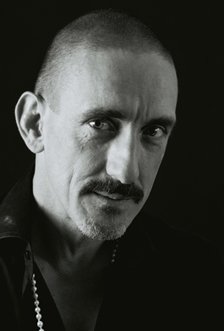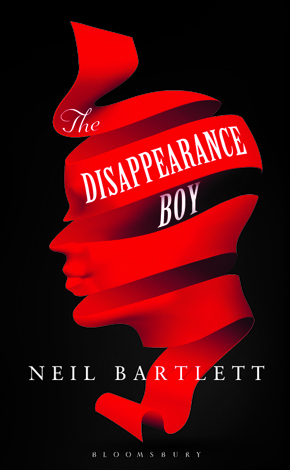Abracadabra!
by Neil BartlettNeil Bartlett’s The Disappearance Boy is a dark tale of lost and found love and fading glamour behind the velvet curtains of 1950s variety theatre, in which magician’s assistant Reggie Rainbow does his best to keep his own thoughts and actions out of sight and mind by sleight of hand. Neil discusses his writing rituals and favourites.
Where are you now?
At my overflowing desk, in my study in Brighton.
Where and when do you do most of your writing?
Right here, and all the hours God sends. But in case a sentence or a thought strikes when I am elsewhere, I carry a notebook.
If you have one, what is your pre-writing ritual?
Reminding myself not to be frightened of writing badly. Then shutting my study door.
Full-time or part-time?
When I write, I write full-time; but I have another life as a theatre director (not to mention a life with my partner of twenty-five years), so I have to carve out and protect that writing time.
Pen or keyboard?
Always pen until first draft, then keyboard.
How do you relax when you’re writing?
By lying down on the study floor and napping. Or cooking. Or swimming naked in the sea.
How would you pitch your latest book in up to 25 words?
A tender and compelling story of one young man’s search for love in the Coronation spring of 1953.
Who do you write for?
In this case, for my mother, Pamela Bartlett, who died in 1995.
Who do you share your work in progress with?
At first draft, my agent; at final draft, my partner.
Which literary character do you wish you created?
Lord Henry Wotton… or perhaps Basil Hallward – now there’s a revealing dilemma.
Share with us your favourite line/s of dialogue, poetry or prose.
Oh, so many… but because it evokes such a particular time and place, a night (in Glasgow, in 1977) when I was just discovering how extraordinary my life was going to be, I am going to choose the last line of Robert David MacDonald’s glitteringly beautiful play about art and death, Chinchilla. The line is: “I wonder if anyone will ever realise how wonderful it all was.” I will never forget the slow fade to black of the lights that followed, or the silence…
Which book do you wish you’d written?
The Virtues of the Solitary Bird by Juan Goytisolo.
Which book/s have you most recently read and enjoyed?
I have just re-read Oliver Twist. The best bad book ever written, or the worst good book ever written? Either way, the prose blazes and the characters will populate your nightmares forever.
What’s on your bedside table or e-reader?
Kate Pullinger’s new novel Landing Gear, waiting for me to have time to read it.
Which books do you feel you ought to have read but haven’t yet?
I’ve never finished Barnaby Rudge. I wish I had German, so I could read Fassbinder and Kleist in the original.
Which book/s do you treasure the most?
Jean Genet’s Our Lady of the Flowers.
What is the last work you read in translation?
Racine’s last play, Athalie.
Which story collections would you particularly recommend?
William Goyen’s Had I a Hundred Mouths. Read “Precious Door”, and weep.
What will you read next?
Kate Pullinger’s Landing Gear, the book that’s waiting for me on my bedside table. She and I have been collaborating on an exciting but exhausting online project called Letter to an Unknown Soldier which involves thousands of writers and readers across the country sharing their thoughts about the First World War. Now submissions for that are closed and my own new novel is well and truly launched, I’m going to take a weekend off and devour it in one go.
What are you working on next?
A theatre piece about a hundred-year-old dead transexual. And my new novel.
Imagine you’re the host of a literary supper, who would your dinner guests be (living or dead, real or fictional)?
Robbie Ross, James Baldwin, Bonnie Greer, Angela Carter, Lem Sissay, Kate Pullinger, Basil Hallward, Maya Angelou, Edmund White and Margaret Atwood. I’d love to have Oscar Wilde to dinner of course, but he would ruin the conversation. I’d invite him for coffee and hashish when all the others had gone.
If you weren’t writing you’d be…?
Making love or cooking.
 Neil Bartlett’s first novel, Ready to Catch Him Should He Fall, was voted Capital Gay Book of the Year; his second, Mr Clive and Mr Page, was nominated for the Whitbread Prize; his third, Skin Lane, was shortlisted for the Costa Novel Award and in 2000 he was awarded an OBE for his work as a theatre director and playwright. He lives in Brighton and London. The Disappearance Boy is published by Bloomsbury Circus in hardback and eBook.
Neil Bartlett’s first novel, Ready to Catch Him Should He Fall, was voted Capital Gay Book of the Year; his second, Mr Clive and Mr Page, was nominated for the Whitbread Prize; his third, Skin Lane, was shortlisted for the Costa Novel Award and in 2000 he was awarded an OBE for his work as a theatre director and playwright. He lives in Brighton and London. The Disappearance Boy is published by Bloomsbury Circus in hardback and eBook.
Read more.
neil-bartlett.com
Author portrait © Camilla Broadbent


